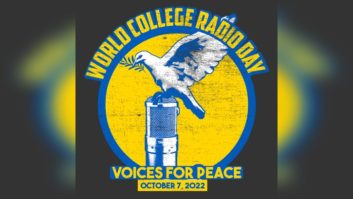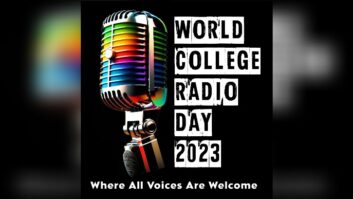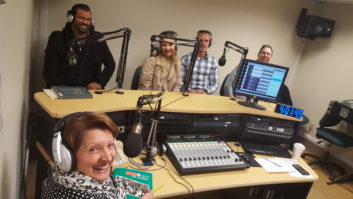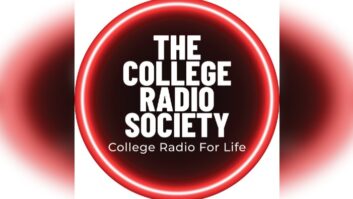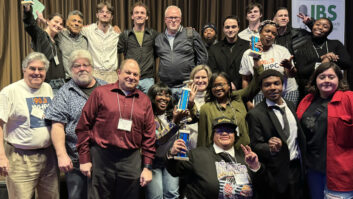
College Broadcasters Inc. held its first solo conference in Atlanta in late October. Although the organization has partnered with other organizations in the past, for multi-day events focused on student media, this marked the debut of the CBI National Student Electronic Media Convention.
I attended CBI’s combined event last year in Orlando and looked forward to this year’s broadcast-focused conference. Having never visited Atlanta, I also had an excuse to see more college radio stations.
Attendees included students and advisers from high school and college radio stations, student television stations and online operations. Held at the Sheraton downtown — which concurrently hosted a Vampire Diaries celebrity autograph convention — the event contained three days of sessions. Tour opportunities were peppered throughout the schedule, including trips to Cartoon Network, WREK(FM) at Georgia Tech and CNN.
I managed to see lots of sessions (from roundtable discussions with music directors and station managers to Q&A sessions with lawyers and FCC experts). I got to visit four college stations and even see a bit of the city.
Soul, metal, jazz, hip-hop and more

Record covers on the ceiling of SCAD-Atlanta.
Credit: All photos by Jennifer Waits
My station visits kicked everything off the first morning as I headed over to WRAS(FM) at Georgia State University.
After a short walk from the hotel, I was greeting by General Manager Anastasia Zimitravich. The station is in the University Center building, which also contains the campus TV station, career services as well as other offices. With a 100,000 watt signal, WRAS is unusual in its broad reach into all of Atlanta and large base of off-campus listeners.
I was surprised to hear that WRAS does not officially broadcast online, although TuneIn does make the stream available to listeners.
With an indie music orientation, the station dubbed “Album 88” asks its DJs with rotation shows to play pre-programmed music from WRAS’s automation system. DJs with specialty shows (those that focus on soul, underground metal, jazz, hip-hop and local music) are allowed to break from that format and select their own music, which is typically played off of laptops or iPods.
After my tour of WRAS, I was able to catch the tail end of a CBI session about social media, which offered helpful tips on the nuances of posting on Facebook vs. Twitter.
Next up was a station at Savannah College of Art and Design (SCAD-Atlanta). I lucked out and connected with the station’s adviser at the conference and she arranged to have her co-adviser Millie DeChirico give me the grand tour. DeChirico graciously picked me up at the hotel (everyone kept telling me that Atlanta is really a “car town”) and gave me a bit of the backstory about SCAD-Atlanta as we drove to the dorm where the station is housed.
Located in a converted retro motel, the dorm (called the Spring House) has a groovy 1970s vibe to it. The three-room, five-year-old, online-only station is funky and cozy and seems reflective of its art student DJs.

A.J. Britt hosts a metal show called ‘We’re Not Gonna Take It,’ at WRAS(FM). As with WRAS, rotation DJs play pre-selected music from automation and specialty music show DJs make their own music selections. While I was there, one of these specialty DJs was playing the music for his show “Psychedelic Dad,” using online tools. He explained that he was playing music from the 1960s to 1980s, songs that you might find in a “dad’s basement.”
A small physical music library contains a collection of mostly CDs, while a digital library has many more selections. Album covers from the 1970s and 1980s lined the ceiling of the studio and I was told that the music director and general manager are particular fans of the smooth sounds of the “yacht rock” artists from that era.
Inside ‘The Vault’
Following the SCAD-Atlanta trip, I headed to nearby Georgia Tech for a group tour of WREK. (It warmed my heart to be on a van full of 20 similarly interested people.)
Upon arrival, we were divided into two groups in order to get tours of the main studio, record library and engineering room. Since it’s a technology-focused school, it wasn’t surprising to hear that much of WREK’s computer tools, including its online playlist functionality, are “home-brewed.”
Although WREK has more of an experimental music focus than WRAS, they still require DJs to play music that has been selected for rotation. Specialty show hosts delve into a variety of genres and some of their music is housed in “The Vault”: a room full of CDs and LPs that date back several decades. I even spotted a stray cassette tape in a section devoted to the metal show, as well as vintage vinyl used by the big band show, “The Desoto Hour.”

WRAS General Manager Anastasia Zimitravich holds a classic Sonic Youth album from the station’s vinyl library. The next day I participated in a CBI panel discussion about promoting and protecting college radio stations, and observed a fascinating panel about block vs. freeform programming. Although I’ve personally DJ’d at stations that are more aligned with freeform, I wanted to hear more about how other stations handle programming.
Millie DeChirico, who had toured me around SCAD-Atlanta Radio the day before, shared some ideas that she’d gleaned from programming at SCAD-Atlanta as well as at Turner Classic Movies (TCM), where she programs TV schedules of classic films (including a night of cult underground films).
Although I watch TCM from time to time, I was completely unaware of the creative themes that they use when compiling a day full of movies. She explained that much like college radio, she finds that she’s coming up with crafty ways to provide context for a range of programs.
Although they broadcast some standard themes (a day devoted to a director or an actress), they also group movies using unexpected themes. One day at TCM might include films with bicycles; another might feature movies that all contain a scene of spaghetti eating.
DeChirico explained that at SCAD they will try to group rock shows on one day and electronic shows on another in order to create some consistency in the air sound. DeChirico’s fellow panelist Michael Taylor from WVVS(FM) at Valdosta State University explained that the station moved to a block format structure in order to incorporate large sections of both rock and urban programming.
He explained that they disperse two-hour blocks of urban or alternative rock throughout the weekly schedule. He said that by offering this mix, they are providing a “sense of unexpected reality,” while at the same time providing a consistent sound within each block through the items selected for rotation and automation.
Radio on the TV
I wrapped up the day with a trip to the Emory University radio station, about a 15-minute cab ride away. Station Manager Adam Valeiras met me at the front of campus and walked me to the station. It was a warm week in Atlanta and a pleasant stroll through campus.
Co-housed with student publications in the Dobbs University Center, WMRE is heard in the dorms on campus cable TV and low-power AM. Itsstudio takes up the majority of the small room in which it’s housed.
DJs can play pretty much whatever they’d like on-air and are only asked to play two songs an hour from the station’s eclectic library of digitized heavy rotation tracks. Since they broadcast over cable, a camera is pointed at the DJs 24/7. Valeiras told me that DJs can blur out the image if they’d like. Although most DJs play digital music, some DJs do play physical music and a CD player and turntable are available for their use.

CBI Swag Swap: Sean Donnellan holds up a WQRI(FM) ‘bro’ shirt. Also pictured: General Manager Trevor Mackinnon (back to camera) and Program Director Austin Schofield (on the right). While there are only a few old vinyl records stashed under a table, vintage 45s decorate the studio walls (including classic 7-inches by Tony Bennett and Starland Vocal Band as well as a novelty record from the Chipmunks).
WMRE is not only a radio station; it also publishes the music magazine Frequency and puts on twice-yearly music festivals. Past copies of Frequency (and its predecessor Listen) are framed and line the walls of the station.
Toward the end of the CBI conference, we listened to keynote presenter Carol Costello, who shared that she had been a college radio DJ and offered the students in attendance some tips for getting a job in broadcasting. Costello focused on social media, admitting that she reluctantly set up a Facebook page and a Twitter account on the behest of her boss.
While Costello said Twitter is still not her favorite forum, she acknowledged that it’s great for breaking news like the impending “Frankenstorm” that was headed for the East Coast as she spoke. She said she loves Facebook and that her page’s community is something that she takes “great comfort” in.
Costello explained that by sticking with a particular persona (in her case “down to earth and approachable”) and maintaining a consistency in terms of the types of things that she posts (“newsy stories about political culture”) she’s been able to attract an engaged and intelligent community of fans.
After Costello concluded her speech, the CBI National Student Production Awards were announced. Student and station finalists and winners came from student television and radio stations from all over the country (and even from Singapore). As winners were announced, short clips of winning entries were played so that we could get a feel for the winning production. CNNRadio correspondent Pat St. Claire MC’d the ceremony.
The conference was a great three days of college radio immersion for me and it was another reminder that students are not only still interested in radio, but that student media are still thriving.
Jennifer Waits earned a master’s degree in popular culture and pens the blog Spinning Indie. She is one of Radio Survivor’s three co-founders and has been a college radio DJ at four stations. She has been on the air at KFJC(FM), at Foothill College in Los Altos Hills, Calif,, since 1998.






